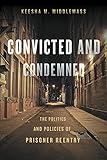Convicted and Condemned : The Politics and Policies of Prisoner Reentry / Keesha Middlemass.
Material type: TextPublisher: New York, NY : New York University Press, [2017]Copyright date: ©2017Description: 1 online resourceContent type:
TextPublisher: New York, NY : New York University Press, [2017]Copyright date: ©2017Description: 1 online resourceContent type: - 9780814724392
- 9780814760185
- 364.809749 23
- HV9281 .M53 2018
- online - DeGruyter
| Item type | Current library | Call number | URL | Status | Notes | Barcode | |
|---|---|---|---|---|---|---|---|
 eBook
eBook
|
Biblioteca "Angelicum" Pont. Univ. S.Tommaso d'Aquino Nuvola online | online - DeGruyter (Browse shelf(Opens below)) | Online access | Not for loan (Accesso limitato) | Accesso per gli utenti autorizzati / Access for authorized users | (dgr)9780814760185 |
restricted access online access with authorization star
http://purl.org/coar/access_right/c_16ec
Winner, W. E. B. DuBois Distinguished Book Award presented by the National Conference of Black Political ScientistsExamines the lifelong consequences of a felony conviction through the compelling words of former prisonersFelony convictions restrict social interactions and hinder felons' efforts to reintegrate into society. The educational and vocational training offered in many prisons are typically not recognized by accredited educational institutions as acceptable course work or by employers as valid work experience, making it difficult for recently-released prisoners to find jobs. Families often will not or cannot allow their formerly incarcerated relatives to live with them. In many states, those with felony convictions cannot receive financial aid for further education, vote in elections, receive welfare benefits, or live in public housing. In short, they are not treated as full citizens, and every year, hundreds of thousands of people released from prison are forced to live on the margins of society. Convicted and Condemned explores the issue of prisoner reentry from the felons' perspective. It features the voices of formerly incarcerated felons as they attempt to reconnect with family, learn how to acclimate to society, try to secure housing, find a job, and complete a host of other important goals. By examining national housing, education and employment policies implemented at the state and local levels, Keesha Middlemass shows how the law challenges and undermines prisoner reentry and creates second-class citizens. Even if the criminal justice system never convicted another person of a felony, millions of women and men would still have to figure out how to reenter society, essentially on their own. A sobering account of the after-effects of mass incarceration, Convicted and Condemned is a powerful exploration of how individuals, and society as a whole, suffer when a felony conviction exacts a punishment that never ends.
Mode of access: Internet via World Wide Web.
In English.
Description based on online resource; title from PDF title page (publisher's Web site, viewed 01. Nov 2023)


